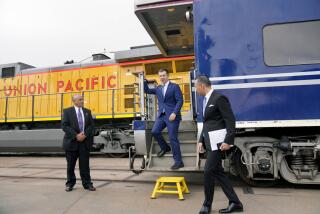BUENA PARK : ‘Super’ Beach Blvd. Project in Spotlight
- Share via
City officials are beginning to grapple with the problems that will be created when six-lane Beach Boulevard is turned into an eight-lane “super street” capable of handling 70,000 cars a day by the end of the decade.
The widening project, from Lincoln Avenue north through the city’s entertainment corridor to the Riverside Freeway, will require taking seven feet of property on each side of Beach to add lanes in both directions. Parking, landscaping and businesses will be affected.
City officials met this week to discuss how to address the relocation of parking and the moving of business signs.
Officials expressed concern about some signs that will have to be relocated and that don’t conform to current city regulations. They also expressed a desire to see some signs replaced.
“It’s no secret that I’d like to see the Studio Theater sign a 1-inch-by-1-inch square,” said Mayor Rhonda J. McCune, referring to the adult movie theater on Beach Boulevard. “It detracts from the family atmosphere we’ve tried to develop here.”
Thomas E. Lynch, development services director, said city leaders need to establish a sign policy that will apply equal standards to all businesses. Such a policy, he said, would ensure that the city “is not picking on any business or giving one business any advantage over another one.”
Another issue officials discussed was who must pay to relocate signs, which in most cases will be costly. Signs such as the big, flashy Movieland Wax Museum sign will hang over the right-of-way after the street is widened, said Don Jensen, public works director.
The cost to move such a sign is estimated at about $100,000, Jensen said. But he added: “The cost doesn’t justify moving it back two feet.”
Jensen said if signs must be relocated because of the widening, Caltrans will be required to pay the cost.
Meanwhile, Caltrans is beginning to contact property owners to negotiate buying land and paying to move signs, Jensen said.
The construction phase in the so-called entertainment corridor, which includes Knott’s Berry Farm, Medieval Times, Wild Bill’s Dinner Extravaganza and hotel and motels, isn’t expected to begin for at least two years, Jensen said. He added that construction is expected to take a year to 15 months to complete.
The widening planned between Manchester Avenue, north of the Riverside Freeway, to Emery Street will also affect roadside merchants since on-street parking will be eliminated to add the new lanes.
Jensen said many of those businesses have no off-street parking. He said the city plans to encourage business owners to share rear parking spaces. The city also could decide to buy property to build a community parking lot.
To lessen the impact of that phase of the super-street project, on-street parking will be allowed most of the day--during off-peak traffic hours--for the first year after the boulevard is widened.
That part of the project is scheduled to begin early next year and will take about a month, Jensen said.
A third phase of the project will stretch one mile from Stage Road north past Rosecrans Avenue and will include reconstruction of the street and widening to three lanes in each direction. Construction is scheduled to begin in late 1993.
More to Read
Sign up for Essential California
The most important California stories and recommendations in your inbox every morning.
You may occasionally receive promotional content from the Los Angeles Times.













